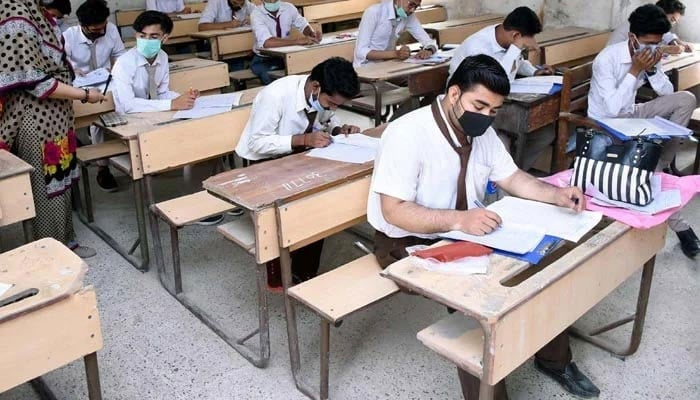Redefining grading in Matric/Inter exams: Readiness check
THE INTER BOARDS Coordination Commission's (IBCC’s) new grading system for Secondary School Certificate (Matric) and Higher Secondary School Certificate (Intermediate) exams holds significance for two key reasons.
Firstly, it aims to mitigate intense competition among students by curbing marks inflation. It is aimed to alleviate the competitive culture among students and shield them from societal pressure to attain maximum marks.
Secondly, and more significantly, it endeavours to establish essential uniformity within the country's examination system regarding grading standards as it will be implemented by all the public and private examination boards of Pakistan.
According to the IBCC’s website, the new system, phased in over three years starting in 2023 and fully adopted by 2025, sets passing marks at 40% instead of the previous 33% and encompasses a shift from a 7-point alphabetical grading system to a 10-point scale. While the level of difficulty to pass exams has increased, the new system emphasises descriptors for specific grades (e.g., remarkable, outstanding, exceptional) rather than direct comparisons to the older grading scale.
The IBCC also hopes that the grade points will help to calculate Grade Point Average (GPA) and Cumulative Grade Point Average (CGPA). The Commission also envisions that starting from 2025, all colleges and universities will refer to CGPA only for admissions as raw marks will not be shown in the marks-sheet.
The IBCC, which was previously known as the Inter Board Committee of Chairmen, also encourages schools to align their grading criteria with this new system to ensure familiarity and adjustment among students and teachers. While the IBCC website and its officials claim that the new system started from 2023, the recent results of Matric Exams by Lahore and rest of the eight exam boards in Punjab refute this claim. The Boards of Intermediate & Secondary Education (BISEs) in Punjab still follow a 6-point grading system while the passing marks are still 33%. It is understandable that administrative and bureaucratic processes within Punjab's and other province’s education departments might influence the delay, as decisions related to educational reforms often involve complex policy considerations and deliberations. Nonetheless, authorities should prioritise adequate preparation and adaptation in order to adopt the new system fully by 2025.
The successful implementation of the new grading system by the IBCC requires a concerted and expedited effort, not only in its execution but also in proactive engagement with provincial governments. This proactive engagement is crucial to ensure that the benefits of this updated system extend uniformly to all students across Pakistan. It's imperative that this transition isn't merely an experimental phase but evolves into a robust and sustainable system.
Efficient collaboration between the IBCC and provincial governments becomes pivotal for the effective establishment of the new grading system. This collaboration should encompass swift decision-making, timely dissemination of information, and the allocation of necessary resources to avoid any delay or confusion.
The adoption of a uniform grading system across all exam boards is crucial for establishing a harmonised educational environment, promoting fairness, transparency, and standardisation in evaluating students' academic accomplishments.
-
 Funeral Home Owner Sentenced To 40 Years For Selling Corpses, Faking Ashes
Funeral Home Owner Sentenced To 40 Years For Selling Corpses, Faking Ashes -
 Why Is Thor Portrayed Differently In Marvel Movies?
Why Is Thor Portrayed Differently In Marvel Movies? -
 Dutch Seismologist Hints At 'surprise’ Quake In Coming Days
Dutch Seismologist Hints At 'surprise’ Quake In Coming Days -
 Australia’s Liberal-National Coalition Reunites After Brief Split Over Hate Laws
Australia’s Liberal-National Coalition Reunites After Brief Split Over Hate Laws -
 DC Director Gives Hopeful Message As Questions Raised Over 'Blue Beetle's Future
DC Director Gives Hopeful Message As Questions Raised Over 'Blue Beetle's Future -
 King Charles New Plans For Andrew In Norfolk Exposed
King Charles New Plans For Andrew In Norfolk Exposed -
 What You Need To Know About Ischemic Stroke
What You Need To Know About Ischemic Stroke -
 Shocking Reason Behind Type 2 Diabetes Revealed By Scientists
Shocking Reason Behind Type 2 Diabetes Revealed By Scientists -
 SpaceX Cleared For NASA Crew-12 Launch After Falcon 9 Review
SpaceX Cleared For NASA Crew-12 Launch After Falcon 9 Review -
 Meghan Markle Gives Old Hollywood Vibes In New Photos At Glitzy Event
Meghan Markle Gives Old Hollywood Vibes In New Photos At Glitzy Event -
 Simple 'finger Test' Unveils Lung Cancer Diagnosis
Simple 'finger Test' Unveils Lung Cancer Diagnosis -
 Groundbreaking Treatment For Sepsis Emerges In New Study
Groundbreaking Treatment For Sepsis Emerges In New Study -
 Roblox Blocked In Egypt Sparks Debate Over Child Safety And Digital Access
Roblox Blocked In Egypt Sparks Debate Over Child Safety And Digital Access -
 Savannah Guthrie Addresses Ransom Demands Made By Her Mother Nancy's Kidnappers
Savannah Guthrie Addresses Ransom Demands Made By Her Mother Nancy's Kidnappers -
 OpenAI Reportedly Working On AI-powered Earbuds As First Hardware Product
OpenAI Reportedly Working On AI-powered Earbuds As First Hardware Product -
 Andrew, Sarah Ferguson Refuse King Charles Request: 'Raising Eyebrows Inside Palace'
Andrew, Sarah Ferguson Refuse King Charles Request: 'Raising Eyebrows Inside Palace'




